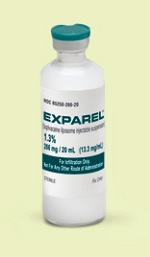 Pacira's ($PCRX) liposomal-encased bupivacaine medication was touted at the annual Miami Breast Cancer Conference as an effective postoperative pain reliever following breast removal or reconstruction.
Pacira's ($PCRX) liposomal-encased bupivacaine medication was touted at the annual Miami Breast Cancer Conference as an effective postoperative pain reliever following breast removal or reconstruction.
The injectable medication, marketed as Exparel, delivers bupivacaine that's housed in multivesicular liposomes, enabling localized, extended release. The drug, commonly referred to as LEB, consists of an outer lipid membrane that surrounds multiple inner membranes that form chambers loaded with the active ingredient.
Exparel's effect typically lasts for three days. "You can really see a difference around day 3, when patients start taking more oral medications for pain control because the liposomal bupivacaine is starting to wear off," said Dr. Valerie Lemaine of the Mayo Clinic during a presentation, according to General Surgery News.
Exparel is administered differently depending on the patient, Lemaine said in the article: "I perform a field block and inject the entire surgical site following the mastectomy. The injection is intramuscular and sometimes also subcutaneous. I adjust the dilution and, for example, in very large-breasted women, I may increase my dilution. I make these decisions intraoperatively, on a case-by-case basis, based on body habitus and size of the surgical site."
She said patients receiving the drug had lower mean pain scores. Another advantage of the medication include a reduction a in the use of opioids.
"The nature of release and later metabolism might give LEB a safety advantage. A reduction in the total dose of bupivacaine needed to achieve a clinical benefit is another reported benefit," said the University of Pennsylvania's Dr. Basavana Goudra during his comments on the presentation, according to General Surgery News. He added that the benefits of Exparel over a combination of traditional bupivacaine with epinephrine has not been proven statistically.
Exparel is also used in other surgeries including hemorrhoidectomy, bunionectomy, colectomy and total knee arthroplasty.
In March, the FDA rejected Pacira's bid to expand Exparel's indication to include use in nerve block procedures, in which the analgesic would be injected close to a nerve to provide widespread numbing after the surgery.
Exparel accounted for nearly all of Pacira's $197.6 million in 2014 revenues. Prior to the rejection of its expanded indication, Pacira estimated revenues would be as high as $330 million in 2015.
- read the article in General Surgery News